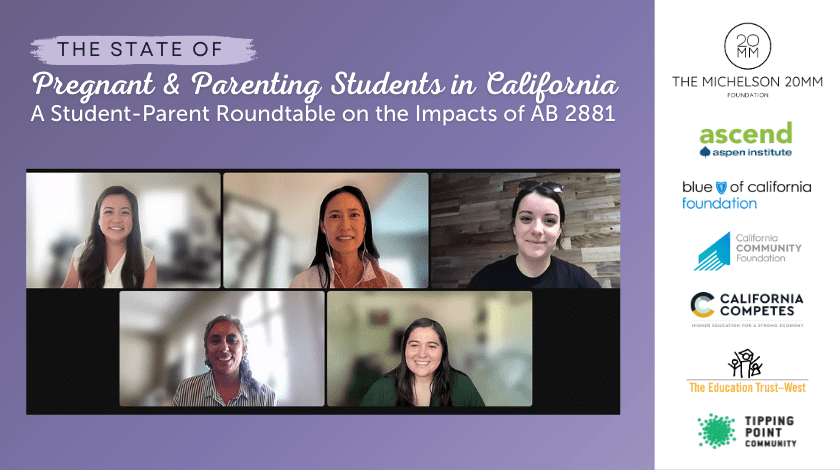By Dr. Queena Hoang
By Dr. Queena Hoang
Student-parents are more likely than nonparents to be people of color, women, low-income, older than 30, and first-generation college students, adding layer upon layer of obstacles to degree completion. According to a national parent student survey, 40% of parenting students feel isolated on their campus and disconnected from their college community, while 20% perceive themselves as unwelcome on their campuses.
AB 2881: Offering Hope for Student Parents
With the passing of AB 2881 in 2022, colleges throughout the state are offering support for this diverse student population. To uplift and help address the challenges encountered by pregnant/parenting students, AB 2881 granted student parents priority registration along with a centralized location to identify resources available for themselves, including public benefits such as CalFresh and the Special Supplemental Nutrition Program for Women, Infants, and Children (WIC).
To explore the impacts AB 2881 has had on student parents, Dr. Tina Cheuk moderated a roundtable discussion with student parents Andii Barnett from Fresno State, Arazeli Castillo from San Jose City College, and Marisa Pizano from California State University, Channel Islands, and Ventura College. The student mothers shared their personal insights and experiences navigating their respective institutions, as well as how priority registration changed their academic outlook.
“It took me a long time to find my village and then learn to trust people within my village.” -Andii Barnett
The Challenges Student Parents Face on Campus
We know that student parents can be pulled in many directions as they focus on academics while juggling the demands of caretaking and family responsibilities. These competing priorities make it difficult for students to be actively engaged on campus and mean they are less likely to use available resources.
When asked to share how they navigated their academics and caregiving responsibilities, Pizano mentioned her conflict of wanting to continue her student athlete journey after having her child, “The initial experiences were very difficult, because in my in my head, I’m like, okay, I still want to be a student athlete, but I’m also a parent, so I had to rely on my village a lot.“
As a mother of a son with special needs, Barnett echoed the same sentiments. She shared her struggles with balancing her own class and co-curricular schedule with her son’s medical appointments, daily routines, and school activities. She added, “So leaning on the village that I had to create myself, and learning to trust my village and accept that help [from others], was a big piece of my journey as a parent scholar.”
“A really common trait that I find working with student parents is that if there’s a problem, they will be so persistent and motivated to get at the heart of it because they know this is really important to them and there’s no giving up.” – Dr. Tina Cheuk
Opportunities to Improve AB 2881 Implementation
Although AB 2881 aimed to be a step in the right direction in supporting student parents, there are some kinks to be worked out when it comes to implementation.
Each student shared experiences with their priority registration process. For Castillo, she received system error messages and was blocked out during her designated time. When it came time for Barnett to register, all her courses were full due to others receiving priority over her parenting student status. Pizano found out about priority registration as a parenting student on her own after seeking resources from student services, but mentioned how much it helped with her chaotic and stressful schedule.
Although the students’ experiences were not ideal, they each remained persistent in accessing the resources necessary to successfully complete their degrees. “My experience wasn’t necessarily what I was hoping for, and that’s all right, lessons learned,” Barnett shared.” I do have two friends right now who are moving up to Fresno State, and they got to take advantage of the priority registration… One of them got what she needed, the other one only just recently decided she was going to go to school, and I’m helping her to navigate the scheduling challenges… I’m excited that both of them got registered for the priority registration on our campus. They’re both aware of it, and I’m really excited to see what this all can do for parent scholars.”
It is our hope that in sharing these stories and uncovering some of the roadblocks, we can also help institutions figure out best practices to implement a policy that is meant to improve parenting students’ experiences. Policies such as AB 2881 in California are helping to pave more equitable pathways and futures for student parents all across the country.
Michelson 20MM is a private, nonprofit foundation working toward equity for underserved and historically underrepresented communities by expanding access to educational and employment opportunities, increasing affordability of educational programs, and ensuring the necessary supports are in place for individuals to thrive. To do so, we work in the following verticals: Digital Equity, Intellectual Property, Smart Justice, Student Basic Needs, and Open Educational Resources (OER). Co-chaired and funded by Alya and Gary Michelson, Michelson 20MM is part of the Michelson Philanthropies network of foundations.
To sign up for our newsletter, click here.

